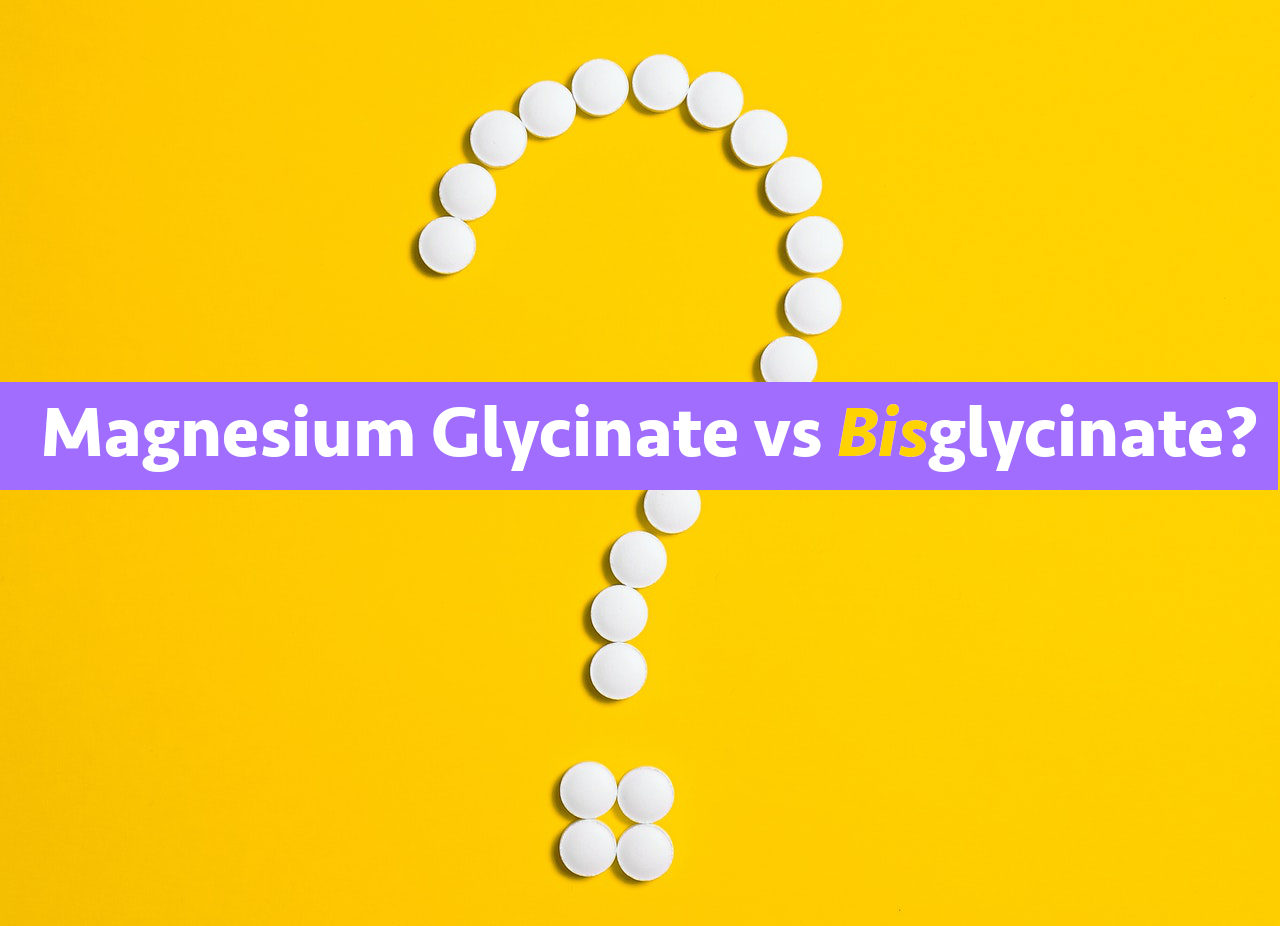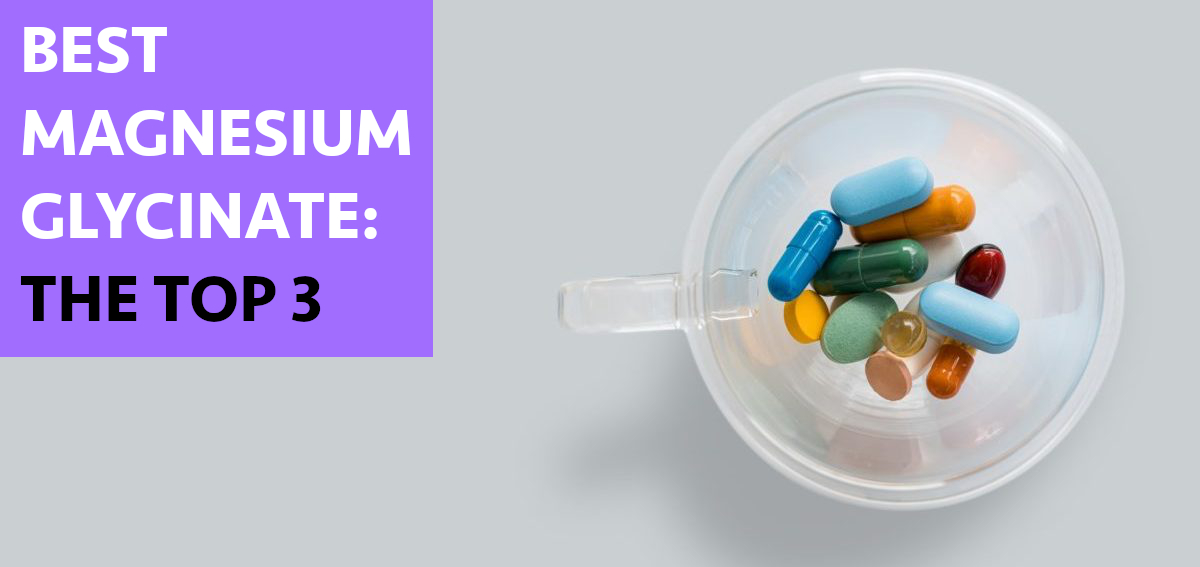The simple difference between magnesium glycinate and magnesium bisglycinate is that magnesium glycinate is the commonly used consumer name, as opposed to magnesium bisglycinate, which is more often used in a scientific manner as its the specific chemical name. It contains 14.1% elemental magnesium by mass.
In actual fact, both magnesium glycinate and magnesium bisglycinate are one and the same. Meaning there is no clear difference and the names refer to the exact same chemical compound. Bisglycinate is the name given to this form of magnesium because it refers to the structure of the chemical compound, as it is one magnesium ion alongside two glycinate ions, hence bisglycinate.
In rare cases you may even here this compound being referred to as magnesium diglycinate, which is another name for the same chemical.
Table of Contents:
- What is the difference between magnesium glycinate and magnesium bisglycinate?
- Which is better magnesium glycinate or bisglycinate?
- Why is magnesium bisglycinate better?
- Is magnesium bisglycinate chelate the same as magnesium glycinate?
- What dose of magnesium glycinate for sleep?
- What percentage of magnesium glycinate is elemental magnesium?
- Why would you choose magnesium glycinate?
What is Magnesium Glycinate?
Simply put magnesium glycinate is the casual or commonly used name for a magnesium compound with two glycinate ions being buffered to it. Magnesium Glycinate’s chemical representation is as follow, C4H8MgN2O4. This compound can also be referred to as magnesium glycinate chelate.
We now know magnesium glycinate is the name of the above chemical compound, but why glycinate? Magnesium is often buffered with another chemical to make absorbtion easier in our body. In this case, mangesium has been buffered with glycine salt. Glycine is a type of amino acid which is made by the body as well as being found in nutritional supplements. Used as an independent amino acid, glycine has a range of unique benefits. For example glycine is one of three amino-acids required by your body to produce Glutathione, a powerful anti-oxidant. Glycine is also the main amino acid required for the production of collagen, which is essential for maintaining the strength of skin, ligaments, muscle & cartilage. Finally, glycine has been shown to have an important effect on improving sleep quality. This could be in part due to a calming effect it has on the brain as well as its ability to mediate body temperature as we fall asleep.
If you’re wondering if magnesium bisglycinate and magnesium glycinate are the same thing, then you would be correct. Both of these names refer to the same chemical compound. The names are used interchangeably but Glycinate is more often used in a consumer setting, whereas bisglycinate is used in more scientific settings. Magnesium glycinate is also commonly referred to as magnesium bisglycinate chelate, as they are the same thing.
Both magnesium glycinate and bisglycinate refer to the same chemical compound, which means neither version are better than one another. Magnesium glycinate is a highly superior form of magnesium to most others including magnesium oxide because it has a much higher absorbtion rate.
It can be difficult to compare magnesium types side by side due to challenges in testing efficacy, however many people report magnesium bisglycinate to be the best due to the tremendous advantages it has over other magnesium compounds, likely due to higher rate of absorbability and bioavailability, which is why its preferred in treating magnesium deficiencies. Considering the additional benefits that glycine has, such as a calming effect and ability to improve sleep quality, it further boosts the powerful nerve regulating effects magnesium already possesses.
Magnesium glycinate will sometimes be referred to as magnesium bisglycinate chelate, which can be considered its full name. Magnesium bisglycinate chelate is the same compound as magnesium glycinate. Magnesium is often chelated to an amino acid for the purpose of better absorbtion in the body, in the case of magnesium glycinate it has been chelated by attaching 2 glycine amino acids to 1 magnesium atom.
Magnesium glycinate is often considered superior for improving sleep quality because it contains both magnesium and glycine, both of which have been shown to reduce symptoms of insomnia, as well as promote a deeper sleep. Safe dosages for magnesium glycinate are set between 350-420mg for adults. Although dosing can vary depending on a persons age and weight, as well as if the person is suffering from a pre-existing magnesium deficiency.
Magnesium glycinate contains 14.1% elemental magnesium by mass. Which means 709mg of magnesium glycinate is needed to obtain 100mg of elemental magnesium. Many people report magnesium is favoured due to its high absorbtion of elemental magnesium making it a potent dietary supplement.
Summary – Magnesium Glycinate vs Magnesium Bisglycinate
To summarise, there is no key distinction between magnesium glycinate and magnesium bisglycinate as they are one and the same. Whilst magnesium glycinate is a more commonly seen term for consumers, people will use the term magnesium bisglycinate where scientifically correct terms are required.
Why would you choose magnesium glycinate?
Magnesium glycinate is preferred by a number of people due to its distinctly high absorption rates. When more magnesium is absorbed it means less magnesium makes its way to our digestive tract, this will often occur when using other cheaper forms of magnesium which can result in digestive disturbances such as diarrhea. People who have experienced digestive problems with other forms of magnesium will likely benefit from magnesium glycinate. What’s more magnesium glycinate benefits from the addition of glycine which has been shown to improve and modulate sleep quality. Many people use magnesium to aid in sleep regulation which would make magnesium glycinate the best choice to aid in sleep as well as used to reduce anxiety or nervousness.


